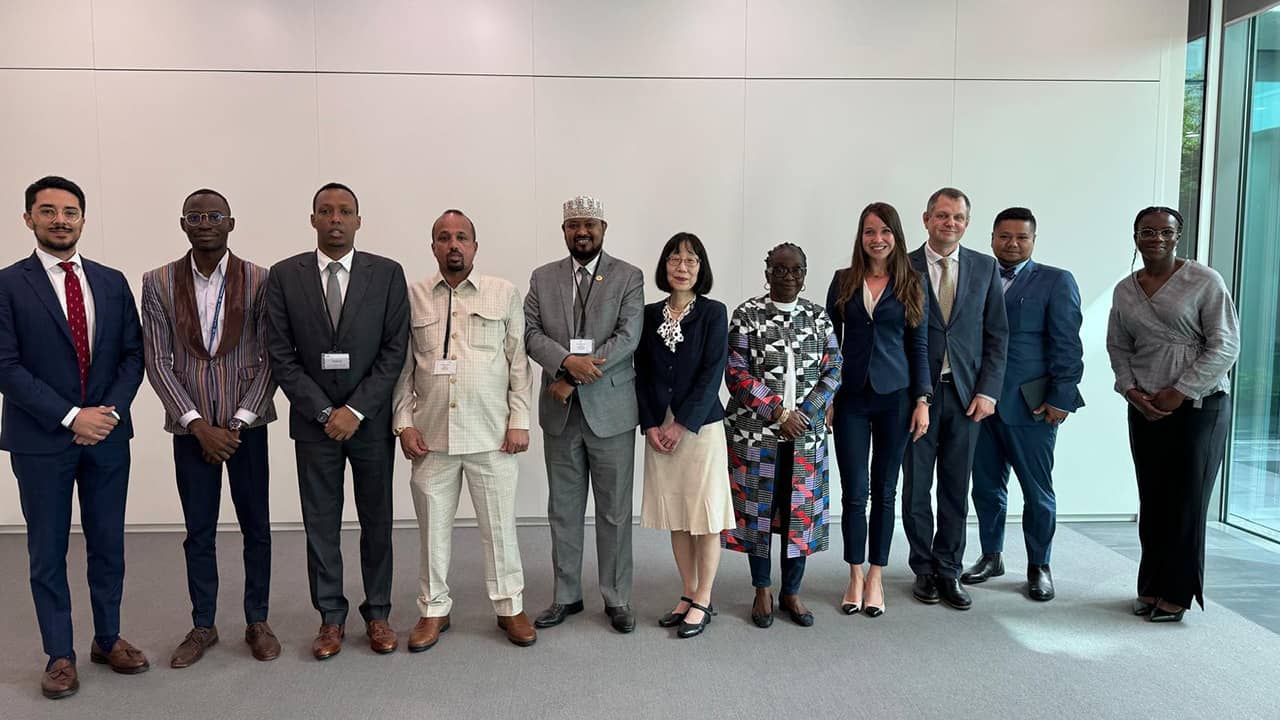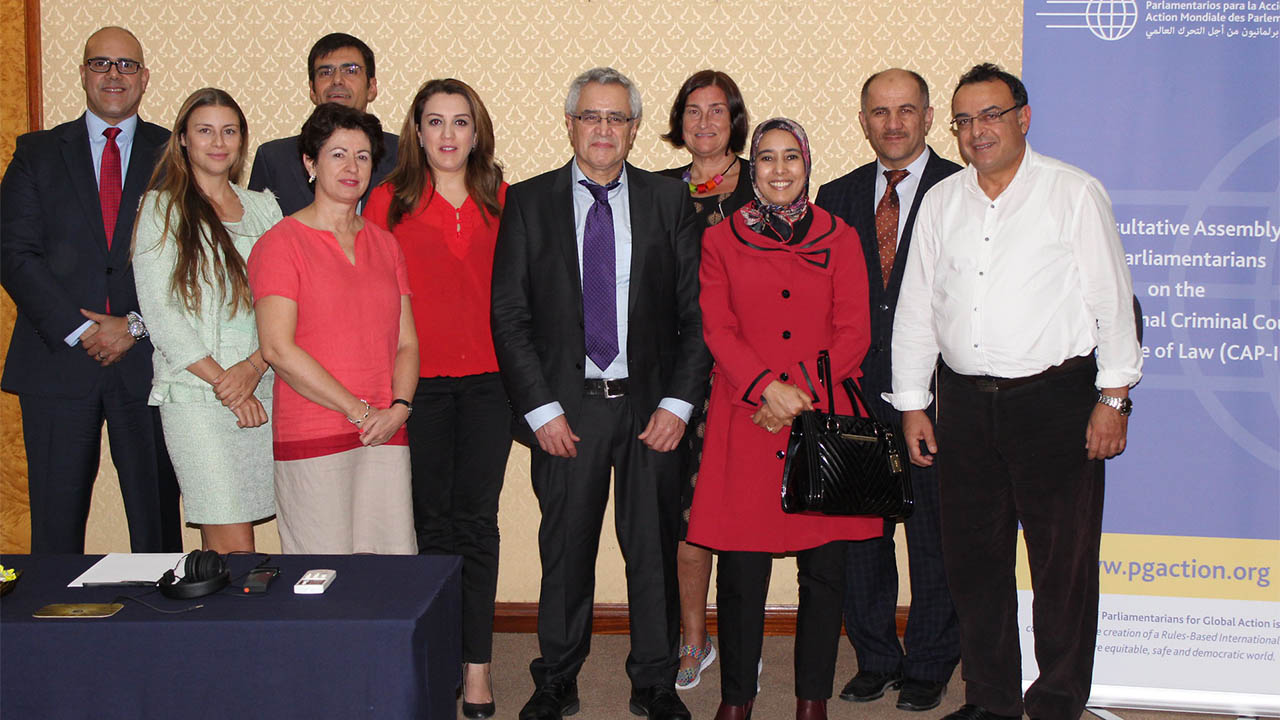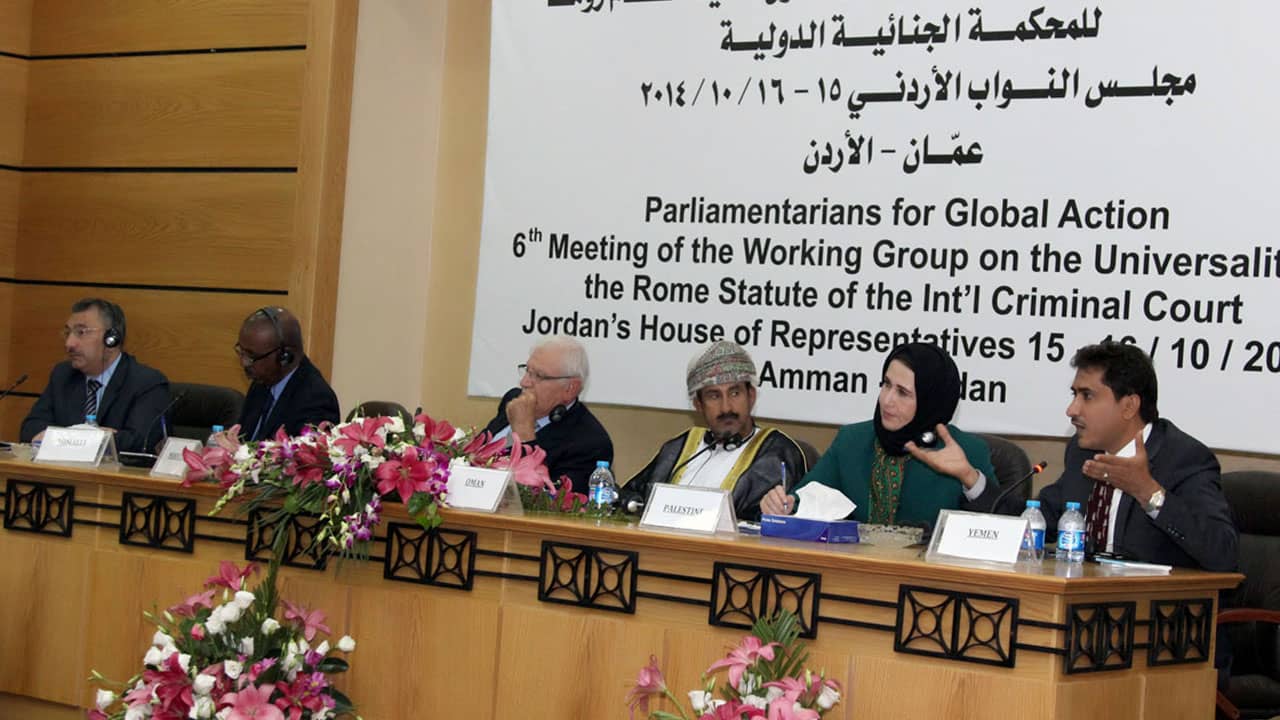Durante más de 30 años, Somalia ha sufrido ciclos recurrentes de violencia armada, inseguridad e inestabilidad que han creado un entorno propicio para la comisión de atrocidades y ataques contra civiles. En este contexto, existe una enorme necesidad de rendición de cuentas en el país y de defensa del derecho internacional. Por ello, PGA se ha comprometido a colaborar activamente con sus miembros en Somalia para impulsar el proceso de adhesión al Estatuto de Roma y promover el Estado de Derecho. Aprovechando la determinación política de sus miembros parlamentarios, PGA ha ofrecido un amplio apoyo técnico para facilitar este objetivo crucial.
El estrecho trabajo de PGA con Somalia comenzó en 2014 con la participación de dos parlamentarios en la 6ª Reunión del Grupo de Trabajo de PGA sobre la Universalidad del Estatuto de Roma de la Corte Penal Internacional en Oriente Medio y el Norte de África (enlace disponible en inglés). Durante esta reunión, el Miembro de PGA, el Sr. Abdirahman Hosh Jibril, ex Ministro de Asuntos Constitucionales y Reconciliación del Gobierno Federal de Transición de Somalia, confirmó su firme compromiso de poner en marcha el proceso de ratificación en Somalia mediante la sensibilización y la creación de voluntad política en la opinión pública, el Parlamento y el gobierno, destacando el imperativo de que Somalia se una al sistema del Estatuto de Roma en el contexto de los continuos ataques de Al-Shabab contra la población. Además, el Miembro de PGA, el Sr. Abdi Ali Hassan, Presidente de la Comisión Electoral Nacional en ese momento, destacó la prioridad de crear una estrecha alianza con las organizaciones de la sociedad civil somalí e internacional para lograr el objetivo de la adhesión al Estatuto de Roma.
La visita a la CPI en 2022 (enlace disponible en inglés) del Presidente del Parlamento Federal de Somalia, S.E. Adan Mohamed Nuur Madobe, presentó nuevas oportunidades y, en particular, un compromiso renovado hacia la adhesión al Estatuto de Roma. Posteriormente, la CPI solicitó la asistencia técnica de PGA en este proceso y se comprometió directamente con el entonces Asesor Especial del Presidente del Parlamento sobre relaciones interparlamentarias, el Sr. Mahad Haji, para promover la adhesión al Estatuto de Roma. En marzo de 2023, la Secretaría envió al Sr. Haji el proyecto de modelo de instrumento de adhesión de PGA y un memorando explicativo sobre la adhesión y todas las enmiendas al Estatuto.
Además, en abril de 2023, PGA facilitó una reunión entre el Sr. Haji y la Fiscal Adjunta de la CPI, la Sra. Nazhat Shameem Khan, para discutirperspectivas sobre la adhesión y hacer frente a los conceptos erróneos sobre el Estatuto de Roma, y otra con los co-facilitadores sobre la Universalidad de la Corte Penal Internacional - Países Bajos y la República de Corea – con el objetivo buscar asistencia en lo relativo a la adhesión. Tras los debates, los Países Bajos facilitaron la traducción del Estatuto de Roma al somalí, que posteriormente se compartió con las partes interesadas, incluidos parlamentarios y funcionarios del gobierno del país.
Durante la 22ª Sesión de la Asamblea de los Estados Parte celebrada del 4 al 14 de diciembre de 2023, PGA invitó a la Hble. Marwa Abdibashir Hagi, Parlamentaria de Somalia, a participar un evento paralelo sobre "Por qué importa la universalidad:La importancia de ratificar el Estatuto de Roma, sus Enmiendas y el Acuerdo sobre Privilegios e Inmunidades"(enlace disponible en inglés). El acto subrayó la necesidad crucial de ratificar e implementar del Estatuto de Roma como paso fundamental para que los autores de atrocidades rindan cuentas. De igual forma, tras del evento, PGA facilitó una reunión bilateral entre la Hble. Hagi y el entonces Presidente del CPI, Juez Piotr Hofmański, durante la cual la Sra. Hagi reafirmó que, a pesar de la situación política actual, el Parlamento Federal estaba comprometido con el avance del proceso de adhesión en el país.
En enero de 2024, varios miembros de PGA de Somalia presentaron el proyecto de ley de adhesión al Estatuto al Presidente del Parlamento para su inclusión en el orden del día de la próxima sesión legislativa. Sin embargo, el proyecto de ley fue rechazado por motivos procedimentales. Tras este revés, la secretaría de PGA redactó una carta explicativa para subrayar la importancia del sistema del Estatuto de Roma, que luego se compartió con los 275 miembros del Parlamento, incluidos el Presidente y los Vicepresidentes del país. Para seguir sensibilizando y ayudando en el avance del proceso de adhesión, del 28 al 31 de mayo de 2024, PGA organizó una visitaparlamentaria de alto nivel de la República Federal de Somalia a la CPI(enlace disponible en inglés) y otras instituciones internacionales en La Haya.
| Firma, ratificación y adhesión al Estatuto de Roma de la CPI | |
|---|---|
| Fecha de la firma: | Aún no firmado. |
| Fecha de la ratificación: | Aún no ratificado. |
| ENMIENDAS AL ESTATUTO DE ROMA | |
|---|---|
| Ratificación de la Enmienda de Kampala al Artículo 8 del Estatuto de Roma sobre Crímenes de Guerra [uso de armas envenenadas, gases asfixiantes o balas que se ensanchan en CANI] (2010): | No |
| Ratificación de la Enmienda de Kampala al Estatuto de Roma sobre el Crimen de Agresión reflejada en el Artículo 8 bis (2010): | No |
| Ratificación de la Enmienda al Artículo 124 del Estatuto de Roma (2015): | No |
| Ratificación de la Enmienda al Artículo 8 del Estatuto de Roma sobre Crímenes de Guerra [uso de armas biológicas] (2017): | No |
| Ratificación de la Enmienda al Artículo 8 del Estatuto de Roma sobre Crímenes de Guerra [uso de armas láser cegadoras] (2017): | No |
| Ratificación de la Enmienda al Artículo 8 del Estatuto de Roma sobre Crímenes de Guerra [fragmentos no detectables] (2017): | No |
| Ratificación de la Enmienda al Artículo 8 del Estatuto de Roma sobre Crímenes de Guerra [inanición como crimen de guerra en CANI] (2019): | No |
| Adopción de legislación nacional sobre el Estatuto de Roma de la CPI | |
|---|---|
|
Somalia no ha tipificado como delito ninguno de los crímenes principales del Estatuto de Roma. No hay referencias a los principios generales del derecho penal ni disposiciones sobre cooperación con la CPI. |
|
| Acuerdos de cooperación | |
|---|---|
| Ratificación sobre los Privilegios e Inmunidades de la Corte Penal Internacional (APIC): | No. |
| Firma del Acuerdo sobre Ejecución de Sentencias con la CPI: | No. |
| Firma del Acuerdo sobre Libertad Provisional o Liberación Final con la CPI | No. |
| Firma del Acuerdo Bilateral de Inmunidad con Estados Unidos: | No. |










